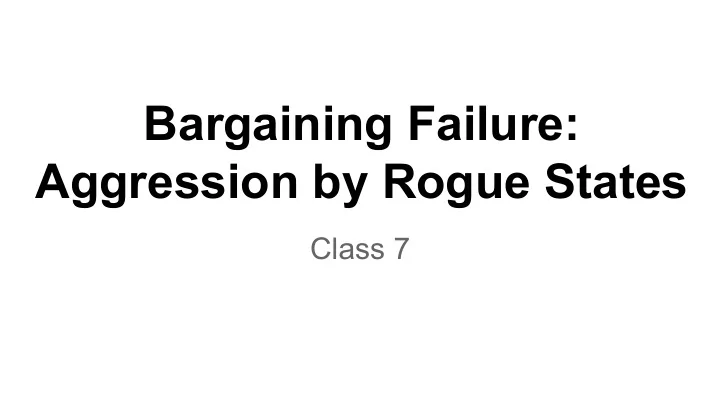

Bargaining Failure: Aggression by Rogue States Class 7
What is a rogue state?
What is a rogue state? ● State behaving contrary to conventional norms of international community. ● Typically, small, insulated and not very influential, especially after 1945.
What is a rogue state? ● State behaving contrary to conventional norms of international community. ● Typically, small, insulated and not very influential, especially after 1945. ● Engage in conflicts that they are unlikely to win, but face few consequences (short of regime change) from losing.
Can powerful states be rogue states? Vs.
Examples of rogue state aggression ● Libya invades Chad ● Iraq invades Iran and Kuwait ● North Korea nuclear program
Libya invades Chad ● Gaddafi had pan-Arab ambitions after gaining power. ● Invaded northern Chad to support Arab rebels in 1978. ● Eventually defeated in 1987. Army loses 10% of troops.
Iraq under Saddam Hussein ● Saddam gains power in 1979. ● Iraq invades Iran in 1980. ○ 8-year stalemate. ● Iraq invades Kuwait in 1990 ○ Removed by US and coalition in 1991.
North Korea and nuclear weapons ● Fall of USSR drastically reduces aid. ● North Korea starts nuclear program in 1994. ● US threatens airstrikes, NK retaliation against the South. ● Deal made for aid to NK.
What do Libya, Iraq and North Korea have in common?
Regime Type and Aggression ● Why do democracies tend to win the wars they fight? ● Why are some autocracies more likely to be aggressive than others?
Democracy and Conflict Initiation
Democracy and Conflict Initiation Democracies are more likely to win wars because they are more selective in the wars the fight, because: ● Threat of leader removal due to loss is greater. ● More effective ways of assessing opponent's’ strength.
Accountability ● Competitive elections hold leaders accountable for losing conflicts. ● Backing down in a standoff or losing a war make leaders unpopular.
Free Press and Opposition ● Leaders’ political opponents and free press demand transparency. ● Gives leaders more clear picture of military effectiveness/probability of victory.
When democracies are attacked, they are more likely to win... ● Soldiers from democracies are better trained and have better morale than soldiers from autocracies.
Examples of democratic selection into conflicts/restraint? From book? Your own?
Do all autocracies fight wars in the same way? How are they distinct?
Do all autocracies fight wars in the same way? How are they distinct? ● Weeks: autocracies vary on two dimensions:
Do all autocracies fight wars in the same way? How are they distinct? ● Weeks: autocracies vary on two dimensions: ○ Is leader personalist? ■ Can members of leader's’ inner circle be assured of keeping positions if leader is deposed? ○ Do leaders/elites have a military background?
Do all autocracies fight wars in the same way? How are they distinct? ● Weeks: autocracies vary on two dimensions: ○ Is leader personalist? ■ Can members of leader's’ inner circle be assured of keeping positions if leader is deposed? ○ Do leaders/elites have a military background?
Machines ● Regime insiders don’t depend on leader for survival. ○ Regime is bureaucratic, civilian-run. ● Act more like democracies regarding conflict. ○ Leaders are cautious.
● Officers can remove Juntas junta leaders. ○ Usually if leaders fails to succeed militarily. ● More aggressive than machines. ● Evaluate conflict from military perspective. ○ Use of military forces may be less costly for armed forces than civilians.
Bosses ● Civilian leader on whom regime elites depend. ○ Usually backed by cult of personality ● More aggressive, more likely to lose wars (or lose more in wars). ○ Bosses can keep spoils from wars and be insulated from costs.
Strongmen ● Personalist leaders with a military background. ○ Retain large personality cult. ● Most aggressive: ○ Have optimism of military juntas. ○ Lack constraint of officer corps.
Which regime types would rogue states fit under?
Are Reiter and Stam and Weeks correct? Are there problems with their arguments?
Dealing with Rogue State Aggression
What strategies can mitigate rogue state aggression? Incorporate legalization/rationalist model of war.
What can be done to ensure that personalist regimes are not aggressive? Regime change is not the best answer (see Iraq, Libya, Syria)
Recommend
More recommend